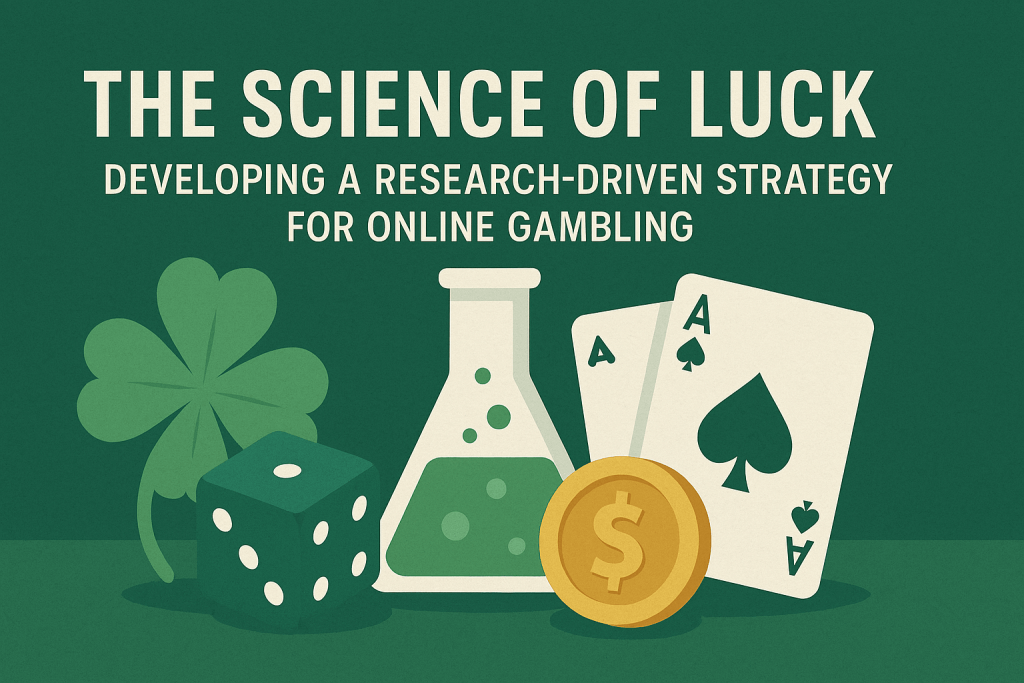Luck gets all the credit, but it’s not the only player at the table. Behind every “lucky streak” is a cocktail of statistics, behavioral patterns, and human psychology at work. While it’s true that gambling involves chance, that doesn’t mean you have to walk into every game blindfolded. This article dives into how a research-based mindset can transform your approach. You’ll learn how probability works, how bias sneaks in, and how to build a structured system that puts logic ahead of superstition—giving you a smarter way to play without chasing illusions.

Laying the Foundation: The Math That Fuels the Game
Every bet you make has a story, and that story is written in numbers. You don’t need to be a mathematician to spot patterns or make smarter choices. But you do need to understand the invisible hands that shape the odds.
Understanding Probabilities vs. Possibilities
- Possibility is the dream, probability is the reality: Sure, it’s possible to win the jackpot on your first spin, but the probability might be 1 in 50 million.
- Focusing on likely outcomes helps long-term thinking: Gamblers who understand odds aren’t swayed by flukes—they measure wins over time.
- Games with low house edge give you breathing room: Blackjack and certain poker formats give you more statistical leverage than slots or keno.
Learning the House Edge on Every Game
- It’s not personal—it’s programmed: Every game has a built-in advantage for the casino. The lower that edge, the better your odds.
- Roulette, for example, varies widely: European roulette has a 2.7% edge. American? Closer to 5.26%, thanks to the extra zero.
- Strategy can shift the odds slightly: Games like blackjack reward correct decision-making with better returns, while pure-chance games stay static.
Tracking Return-to-Player (RTP) Metrics
- RTP is your long-game ally: A 97% RTP means you can expect to get €97 back from every €100—over time.
- Short-term swings don’t reflect long-term truths: High-RTP games can still streak cold. What matters is how they behave across hundreds of plays.
- Some platforms are more transparent than others: Look for games that openly list their RTP. If they don’t, they probably don’t want you to know.
Turning Data into Decisions: Building a Framework for Play
Raw numbers are just the start. Now it’s about putting those numbers to work. A smart strategy uses past data, consistent tracking, and controlled play habits to filter the noise from the signal. It’s like tuning an instrument—you adjust as you go.
Start with a Playbook of Games You Understand
- Familiarity breeds smarter play: Knowing the rules, betting systems, and rhythms of a game gives you more control.
- Narrow your focus: Don’t chase every new release or flashy slot. Stick to a few games and study them.
- Compare variations carefully: One blackjack table may allow doubling after splits—another might not. Those rules affect outcomes more than most people realize.
Track Your Play Like a Researcher
- Keep a detailed session log: Write down stakes, time played, wins/losses, and how you felt during each session.
- Review patterns weekly: Are you losing more when you play tired? Winning more when you play in short bursts? Find the signals in the noise.
- Look for tilt triggers: Did you double your bet after a loss? That emotional reaction matters just as much as the cards.
Use Betting Systems Carefully—and Test Them
- Flat betting is the baseline: Betting the same amount each round lets you isolate skill from luck more clearly.
- Test progressive systems in low-risk formats: Martingale and Fibonacci strategies can eat your bankroll if you’re not disciplined.
- Don’t rely on systems to “beat” the house edge: No system removes it—but the right one can minimize damage during cold streaks.
Evolving Your Strategy Over Time
A strategy isn’t static. Like a good blueprint, it adapts as new tools, insights, and challenges appear. Gambling without reviewing your process is like playing poker with your cards facing down. A strong strategy evolves through iteration and reflection.
Adjust for Emotional and Mental Patterns
- Document your state of mind: You may play worse when frustrated, or overconfident after a big win. Catching those patterns can prevent snowballing.
- Take emotion out of decision-making: The system should be the boss, not your mood.
- Use cool-down periods: Stop playing when the stakes feel personal instead of logical.
Re-evaluate Your Game Mix Regularly
- Some games age well, others don’t: Payout structures, bonus mechanics, or platform algorithms change. Stay current.
- Look at your worst performers: If a game consistently drains your budget, it might not be worth your attention—no matter how fun it is.
- Rebalance toward long-term performers: Shift more of your time and bankroll toward games that give you consistency.
Study, Read, and Stay Curious
- Follow gambling theory communities: Forums, strategy boards, and statistical analysis sites are goldmines for insight.
- Don’t dismiss academic research: Studies on decision fatigue, cognitive bias, and reward anticipation all apply directly to online gambling.
- Run simulations: You can test many systems offline or in demo mode before risking real money.
Conclusion
Luck will always play its part—but leaning entirely on it is like building a house on sand.
By grounding your play in research, pattern recognition, and disciplined testing, you build something stronger. You create a system that doesn’t swing with every emotional high or dip with every loss. Gambling won’t stop being a game of chance, but it can be played with clarity, structure, and control. And when you approach it like a scientist instead of a dreamer, your odds don’t just look better—they become better. That’s the real power of strategy over superstition. Finally, if you want to discover more with The Sun Newspapers, then check out their list of the best online casinos!
